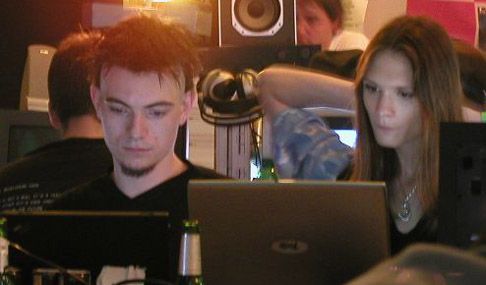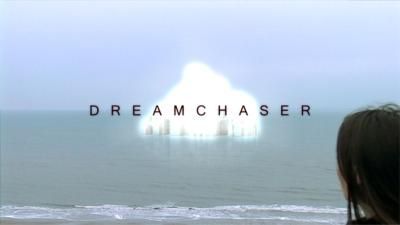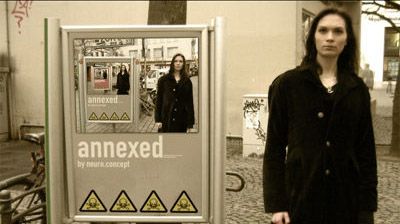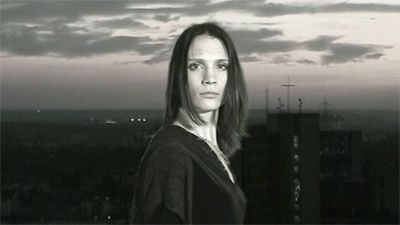In Focus: JCO / neuro.concept (By Adok/Hugi)
 JCO aka Jan C. Obergfell, member of neuro.concept and mindwave, is a 23-year-old musician, video artist, and coder. He has been attending demoparties since 2000 and has released tracks, videos and demos. In real life he is studying computer science in Bonn, Germany. The following interview was conducted on April 26th, 2006, using IRC (which is why, as you'll notice, it's a different style of interview than most of the other interviews in this issue, which were conducted via email).
JCO aka Jan C. Obergfell, member of neuro.concept and mindwave, is a 23-year-old musician, video artist, and coder. He has been attending demoparties since 2000 and has released tracks, videos and demos. In real life he is studying computer science in Bonn, Germany. The following interview was conducted on April 26th, 2006, using IRC (which is why, as you'll notice, it's a different style of interview than most of the other interviews in this issue, which were conducted via email).
When did you get involved with computers the first time?
Haha, good question. I was a little child when I first got involved with my father's c64. Can't name a year, though ;) The computer I wrote my first code with was an Atari STE. I was about 10 or 11 then.
How's your musical education? I assume you play some instruments?
Lots of them. I learned violin from the age of 4 to 11, 4 years piano, and 4 years saxophone. Starting to play violin at such an early age especially gave me a lot of experience - and a good ear.
Have you never thought about studying music?
Yes, of course. But I finally decided against it because it's basically a whole lot of unusable "music-theory" (which actually is not a scientific theory, but a set of annoying rules). And I'm not too interested in history either. But the main reason: Studying music in Germany lacks computers. I'm attending some courses in music science at the university besides computer science, though.
But you want to make computer science your profession.
Don't call it profession... I have no idea if I want to make a living with code.
What are your plans then?
Simply said: there are none. I think it's best just to continue improving my skills in music, code, video, etc. and then I'll see who wants me. The problem is, I want to do a bit of everything and not decide on one thing (while excluding everything else). What I prefer to do changes from month to month. Currently, I'm very much into video art again. At least the university leaves me enough spare time during the holidays to focus on something else. Studying can be a very difficult and stressful job. ;)
That's true. The good thing about studying at university is that you deal with people who understand what they are teaching...
True, true. We have pretty good computer graphics people in Bonn. During my first computer graphics course I learned a whole lot of demo-relevant techniques. I'm still waiting for some time to create a first demo that's not just for fun.
Same in Vienna. The computer graphics institute is one of the biggest institutes at the faculty of informatics. In Vienna, the aim of the first computer graphics course is to teach people how to make a demo.
How did you get started with computer music?
The first experiments concerning electronic music I did with my Atari (it had built in midi ports). But I had no synthesizers, only a digital piano (= boring). I had the bad luck not to get my hands on a tracker until I came to know the demoscene.
I also have a digital piano: Yamaha Clavinova.
Nice! It was some casio-crap for me. ;) I actually got into computer music with my first awe32 and cubase. Since it was capable of playing samples, I was not restricted to nasty general midi soundsets anymore. That was around the mid-nineties. I bought my first synthesizer, a roland xp30, in 1999. It turned out to become a very productive period. I had a lot of time for making music back then, and thus I created one or two tracks every week. At the same time I fell in love with trance music. In my opinion trance reached its peak around 1998/1999. So I focused on that when making music myself, but I always played around with other musical styles as well.
What styles, for example?
The whole area of electronic music (including dnb, chillout-stuff, etc.) in the first place, but also pop, rock, and experimental stuff. And of course, classical music.
I listened to your remix of "Eine kleine Nachtmusik," which was nice. ;) I'm guessing this was for some kind of funcompo?
Haha. Thanks. Yes, it was the shitmusic compo at uc5 iirc. There's a funny story about the Nachtmusik: Somehow a (very good) pianist from the US stumbled over my homepage and listend to this track. He wrote me an email that he had laughed his ass off, and asked me if he might play it at a public rehearsal. He sent me an mp3 of that performance afterwards. I imagine the visitors, expecting "serious" music, had been a little shocked. ;)
What kind of people were among the audience?
I think it was the typical classical-music-consumer type. That means people who hate electronic music. ;)
Okay. ;) What equipment have you used for your more recent pieces of music?
Only a computer and a master keyboard (currently an edirol pcr-1).
What software do you use?
Cubase SX3 and Renoise (won myself a license at Evoke 2002), and a lot of freeware synths and effects (like kb's v2 for example, which I use as a vsti plugin in cubase). I'm making use of a nice sample library too, that grew over the past few years. For mixing and mastering a final version of a track I also use a pair of studio monitors (atm Alesis Monitor One). When I started using them my mixes stopped sucking on huge party pa's.
What are your 'best' tracks in your opinion?
Depends... I have some favorites, depending on the style. But it's hard to make out a best one.
So.. which are your favourites? =) What tracks should people download first?
I consider "Jockel der Gartenteichspringbrunnen" and my recent maxi-single release my best (Synth)Pop-Tracks. My Breakpoint multichannel release (Imperial Code) might be the best schranz-track I've made so far. Among my best trance-tracks are "Ich selbst bin tot" and (still) "When we rise". And my best classical piece is the soundtrack of my most recent video "Dreamchaser".
When did you release your first CD?
The first CD in which I participated as a composer is a Pop-Album called "Impression" by "Sabin," a young German singer, released in early 2005. More important for me is my first maxi single, though. That's "Schau mich bitte nicht so an". I created an alias named "Jakob Bienenhalm" and released it under that name.
It's the one you presented at tUM 2005, right? Why did you chose this alias?
Many reasons - first of all, it's a fitting name, a name that didn't exist before (in google), and the lyrics are German.
Do you plan to release more CDs using this alias?
I plan to continue that project, yes. But first I have to sell a few more. ;) Still have many ideas for Bienenhalm.
How do you distribute your CD?
By the online shop of the label where I work. (www.musicandfriends.com) Sadly, there are no alternatives :/ Almost every CD-shop is owned by the remaining 5 major labels.
OK. So you are working there part-time alongside your university studies?
I'm not actually working on a part-time basis, it's more like I'm participating in the label itself, and trying to build something up.
What's the style of your first maxi-single? Is it trance, too?
No, it's some kind of 80s inspired synth-pop, with a little inspiration of the "Neue Deutsche Welle" and my own personal nonsense :D The tracks can be pre-listened at www.bienenhalm.de.
Do you want to say something more about your music or shall we talk about your videos now?
Okay, let's talk about my video projects :)
When did you start with them and how?
Same as with computers: in my childhood while playing around with my father's old super8 cam. (That's 8mm film.) Later I got my hands on a video 8 camera, and still later a vhs-c camcorder. I started actually editing video with my first dv-camera. I always wanted to do something with video and computers, but it was simply too "messy" and expensive with analogue media. So, I did my first wild demo (an embarrassing one when seen now ;).
When was that?
That was at Takeover 2001, and the thing's called "Robots". My first serious project was "Visual Approach to the Aesthetics of Techno" which I released at Mekka 2002. I founded neuro.concept back then.
What people have been involved in your video projects?
A few friends of mine (non-sceners) participated in "Fear of Redemption" (Evoke 2002), and I did three videos with Faith. Apart from acting, I'm doing everything myself.

Faith and you have also founded mindwave; what's the idea behind that?
While neuro.concept focuses on technical skill and inventing new effects, mindwave represents a different approach. One could say that Mindwave tries to do art.
Some of your wild entries were released as "neuro.concept and mindwave".
True - I meant it that way: There is this neuro.concept-approach for the technical realisation, and the mindwave-approach for the content (visible as well as the stuff that can be interpreted in some way). One might call the mindwave-productions more "seriously meant". But there's still a lot of neuro.concept in it. ;)
What productions have you released so far? What are the messages you want to convey with them?
Everything that's not mindwave so far, and the videos I didn't release as "neuro.concept" are basically fun-projects or experimental stuff. Like the tum-party-video I created with paniq and shorty, or the Bertold Brecht reading I released at GeekCamp 2005 ("Dinge"). In those I didn't intend to convey a particular message or any deeper meaning. Concerning "Out Back Into," "Memorize your Future" and "Dreamchaser" (bp 04, 05, 06): I cannot say any precise meaning ("this one means that") but all of these carry a certain ambiguity. For example, it is possible to interpret each of those "positively" and "negatively," if you understand what I mean. They are all saying something about the "world," but as a human living in this world sees it. However, I could keep talking hours about intentions, about meaning and messages, the obvious vs. the hidden ones and so on. But I think it might be a better idea simply to watch them and think for oneself.
How long does it take to make such a video?
In my experience, 3 to 8 weeks. Actually, "Out Back Into" and "Dreamchaser" required 6-8 and "Memorize your Future" took 3. There are simply a lot of things that have to be done. There's much planning and considering, weighting out what can be done, and what cannot. There can be expenses as well (like a greenscreen). And finally, many things happen that cannot be planned in advance and then something must be faked or done in some other way. ;)
I guess you have to make much more material than what is effectively used.
Of course. Approximately two minutes equal 60 minutes of tape.
I once participated in the making of a 30-minute video when I was 13 or 14; the working on it lasted a whole day.
Exactly - and depending on what you're trying to do, it can become even more extreme, like filming a whole day for one time-lapse shot that takes 3-4 seconds in the final product. And there are those cases where something has to be physically constructed (I'm thinking of cutting lots of green cloth and attaching it to floor and walls ;). But while it's definitely a lot of work, it's really worth it - most sceners know the feeling of creating "something big" out of nothing. And creating videos (especially those that are more than showing off effects) is like creating a world - you get to know this world while you're working on it. That's just a great feeling.
What camera do you use nowadays?
A Panasonic nv-gs400. That's a 3ccd mini-dv camcorder of the lower semi-professional class. I figured out that I needed more manual control, and better image quality - and it makes a huge difference (just compare the filmed parts of "Out Back Into" and "Dreamchaser").
What are the important points of video editing? What is different from making a demo?
The pure editing process is very much like handling a demotool. But there are certain constraints. You can't speed up or slow down time without creating artifacts (of course). Video is hard to correct if something went wrong. And so on. So the difference lies in the preperations that have to be done. From a coder's perspective, gathering video footage equals writing a framework. But while a framwork can simply be altered or redone (just for the price of time), it's a little more difficult with video. Imagine you've shot a lot of scenes in a sunny setting, you find out something has to be redone, and then it rains for two weeks. Another thing that you have to know about video editing: It requires a fast computer and a lot of harddisk space, especially if you want to maintain a "lossless" workflow. That's 25 uncompressed bitmaps per second. ;) One has to be very careful with compression. While compression can make editing easier, it will degrade the quality. So I just stopped doing it. If somebody wants to start working with filmed video, some basic knowledge about dataformats, interlacing, and similar video-related topics are required. But that's not too much and can be quickly learned.
Ah, another big difference to demo making: Editing video is - most of the time - not possible in realtime. This is partly because most of the tools are not capable enough for realtime processing, but also because a lot of data has to go through the computer's memory and its harddrives. This can actually make it difficult to "just try something out."

What computer equipment would you recommend for someone who wants to start video editing?
While an Athlon 750 is still sufficient, it becomes interesting with a Pentium 4 class machine. I recently bought an Athlon x2 (dualcore), and I highly recommend this. Video editing can actually become twice as fast with two cores, because it can be easily parallelized. Additionally, the best configuration would be a raid system (hdd's just can't be fast enough ;) and memory should be as fast as possible. Since no editing-software I know makes use of the gpu, the gfx card still plays a minor part.
Is there anything more you would like to say about videos?
Can't think of anything right now. :)
You've also coded some demos. Which was your first?
My first demo was at Mekka 2000, and it was called "Robospack auf dem Boden der Tatsachen". And yes, it sucked. ;) It is for DOS and uses an uncommon vesa mode, so it's not possible to watch the original version, but I've recently ported it to Windows. It features a plasma, a lame 3d engine, 2d rotations, and nothing else I can think of. ;)
I've found the original at pouet.net. Where will you release the Windows port?
Haha, yes, that's it. I don't plan to release the port. But maybe I'll put it on my new homepage (when it's finished).
What demos did you release afterwards?
The next ones were Gabberhammer and Corehammer. Gabberhammer is pure 2d animation, Corehammer is the result of my first attempt to create a demosystem. I recently released it at pouet.
What projects are you currently working on?
Nothing special at the moment, I need all my time for studying and earning a little money. But I'm already gathering ideas for a new video (planned for Evoke).
OK, then thank you for the interview! 2 hours and 24 minutes have passed.
Longer than I expected. ;) Thank you for giving me the opportunity to tell a little about my activities.
JCO's website is located at www.jco-music.de.
Adok/Hugi & JCO

